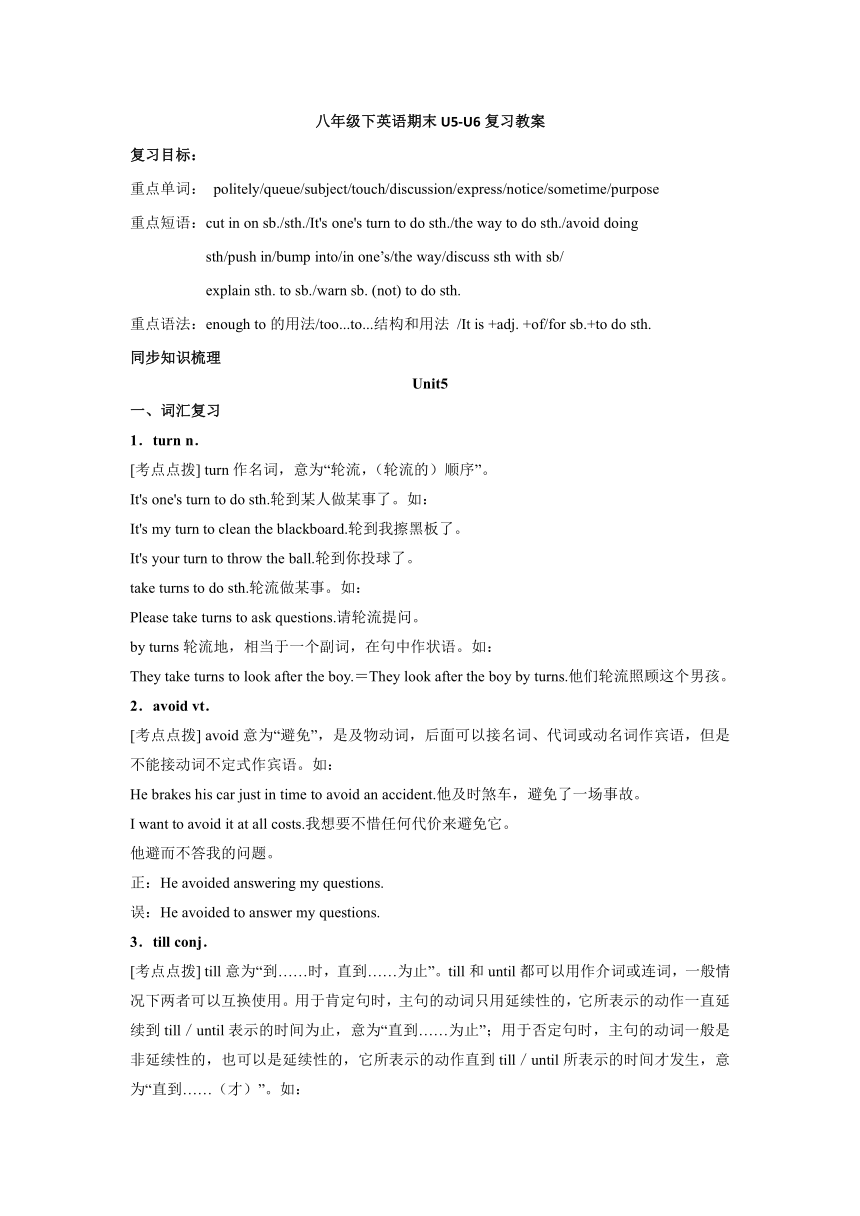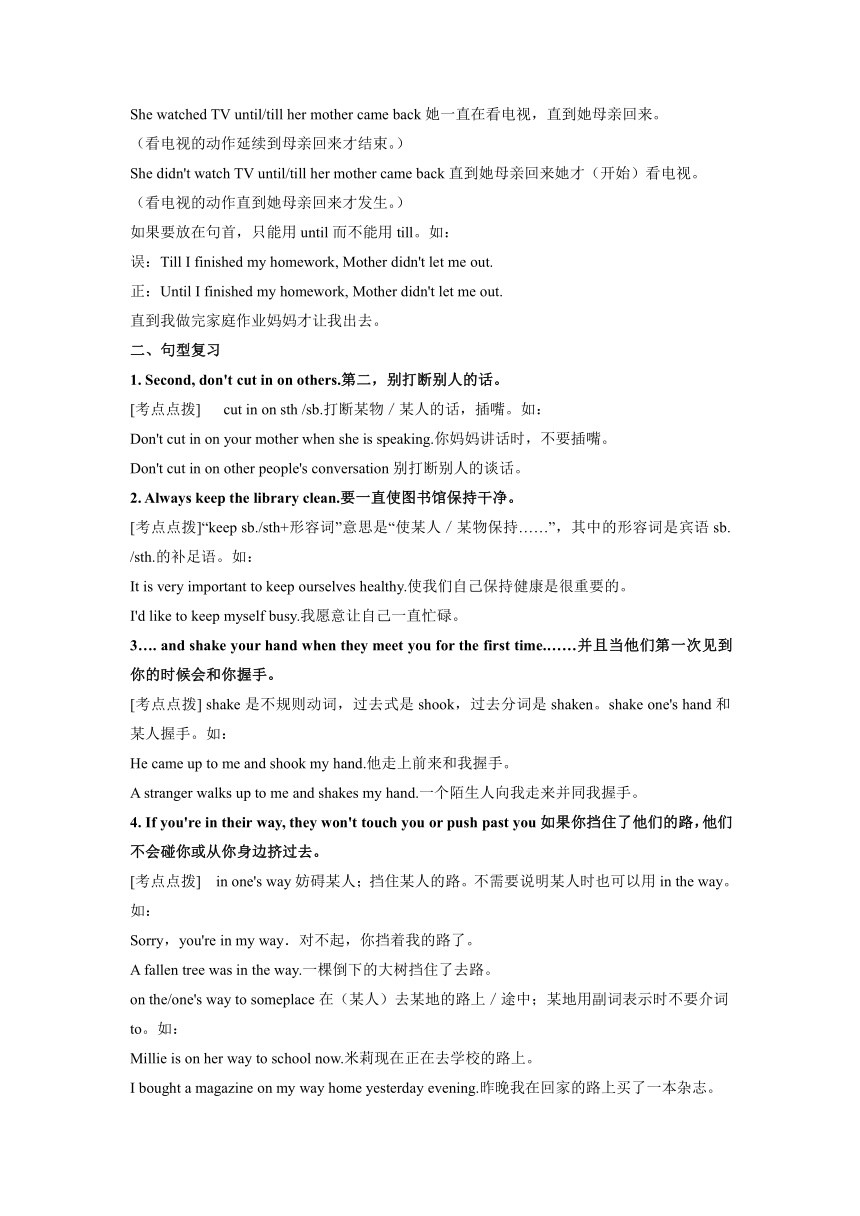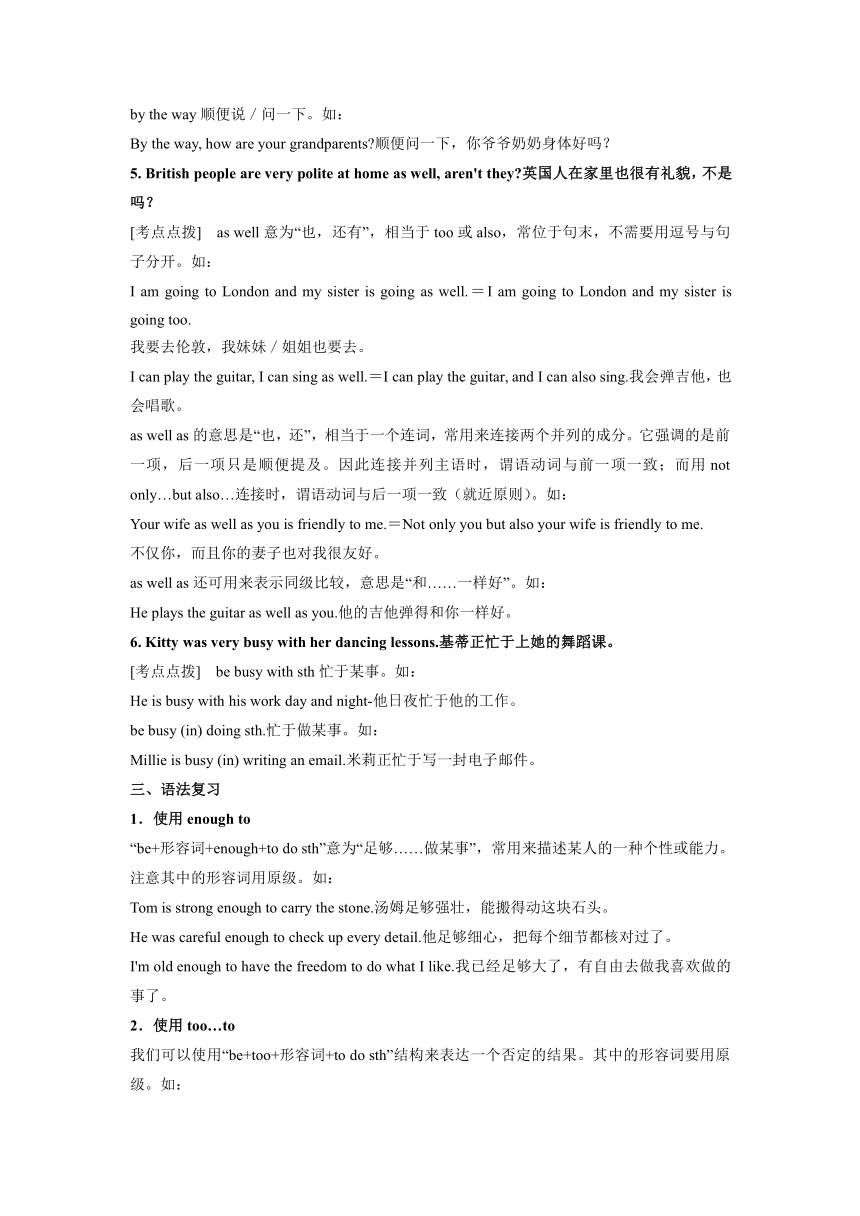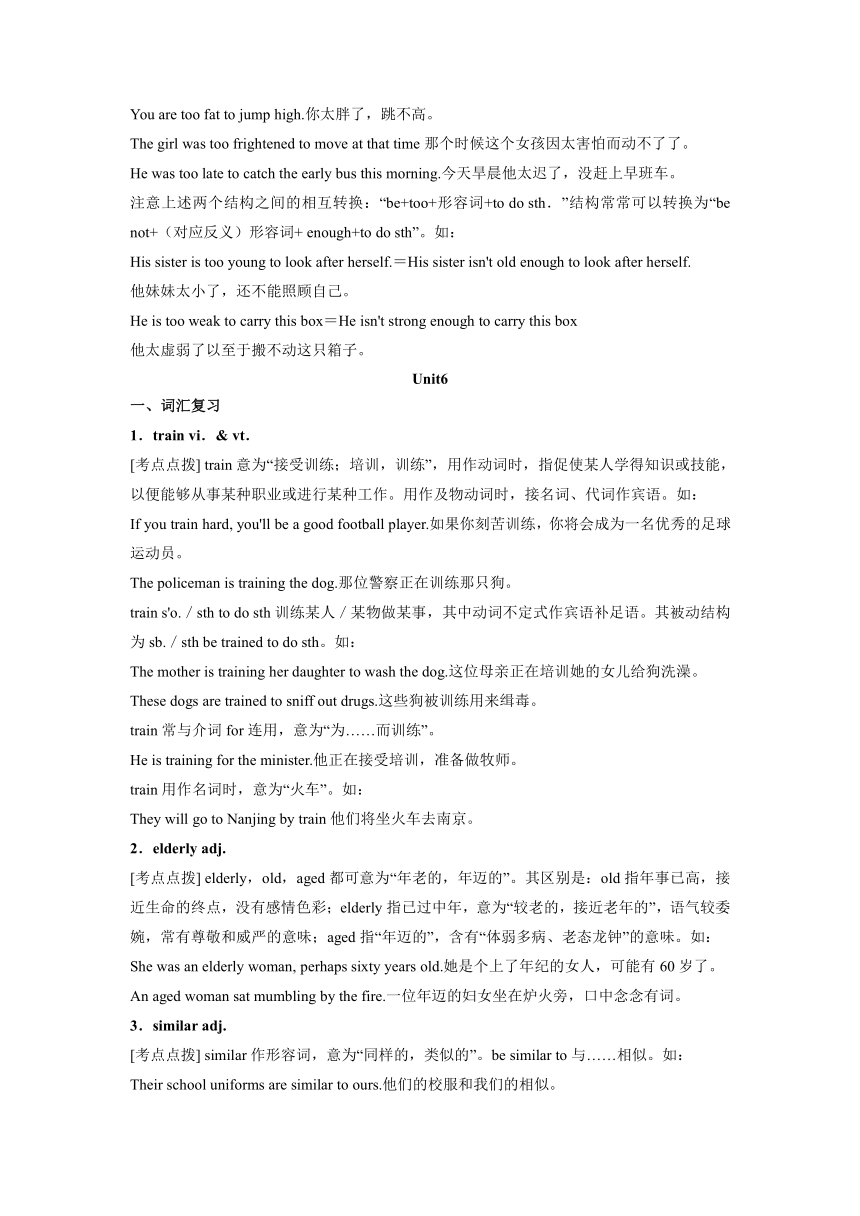江苏省仪征市新城中心牛津译林版英语八年级下期末U5-U6复习学案
文档属性
| 名称 | 江苏省仪征市新城中心牛津译林版英语八年级下期末U5-U6复习学案 |

|
|
| 格式 | zip | ||
| 文件大小 | 26.8KB | ||
| 资源类型 | 教案 | ||
| 版本资源 | 牛津译林版 | ||
| 科目 | 英语 | ||
| 更新时间 | 2019-06-13 00:00:00 | ||
图片预览




文档简介
八年级下英语期末U5-U6复习教案
复习目标:
重点单词: politely/queue/subject/touch/discussion/express/notice/sometime/purpose
重点短语:cut in on sb./sth./It's?one's?turn?to?do?sth./the way to do sth./avoid doing
sth/push in/bump into/in one’s/the way/discuss sth with sb/
explain sth. to sb./warn sb. (not) to do sth.
重点语法:enough to的用法/too...to...结构和用法 /It is +adj. +of/for sb.+to do sth.
同步知识梳理
Unit5
一、词汇复习
1.turn n.
[考点点拨] turn作名词,意为“轮流,(轮流的)顺序”。
It's one's turn to do sth.轮到某人做某事了。如:
It's my turn to clean the blackboard.轮到我擦黑板了。
It's your turn to throw the ball.轮到你投球了。
take turns to do sth.轮流做某事。如:
Please take turns to ask questions.请轮流提问。
by turns轮流地,相当于一个副词,在句中作状语。如:
They take turns to look after the boy.=They look after the boy by turns.他们轮流照顾这个男孩。
2.avoid vt.
[考点点拨] avoid意为“避免”,是及物动词,后面可以接名词、代词或动名词作宾语,但是不能接动词不定式作宾语。如:
He brakes his car just in time to avoid an accident.他及时煞车,避免了一场事故。
I want to avoid it at all costs.我想要不惜任何代价来避免它。
他避而不答我的问题。
正:He avoided answering my questions.
误:He avoided to answer my questions.
3.till conj.
[考点点拨] till意为“到……时,直到……为止”。till和until都可以用作介词或连词,一般情况下两者可以互换使用。用于肯定句时,主句的动词只用延续性的,它所表示的动作一直延续到till/until表示的时间为止,意为“直到……为止”;用于否定句时,主句的动词一般是非延续性的,也可以是延续性的,它所表示的动作直到till/until所表示的时间才发生,意为“直到……(才)”。如:
She watched TV until/till her mother came back她一直在看电视,直到她母亲回来。
(看电视的动作延续到母亲回来才结束。)
She didn't watch TV until/till her mother came back直到她母亲回来她才(开始)看电视。
(看电视的动作直到她母亲回来才发生。)
如果要放在句首,只能用until而不能用till。如:
误:Till I finished my homework, Mother didn't let me out.
正:Until I finished my homework, Mother didn't let me out.
直到我做完家庭作业妈妈才让我出去。
二、句型复习
1. Second, don't cut in on others.第二,别打断别人的话。
[考点点拨] cut in on sth /sb.打断某物/某人的话,插嘴。如:
Don't cut in on your mother when she is speaking.你妈妈讲话时,不要插嘴。
Don't cut in on other people's conversation别打断别人的谈话。
2. Always keep the library clean.要一直使图书馆保持干净。
[考点点拨]“keep sb./sth+形容词”意思是“使某人/某物保持……”,其中的形容词是宾语sb. /sth.的补足语。如:
It is very important to keep ourselves healthy.使我们自己保持健康是很重要的。
I'd like to keep myself busy.我愿意让自己一直忙碌。
3…. and shake your hand when they meet you for the first time.……并且当他们第一次见到你的时候会和你握手。
[考点点拨] shake是不规则动词,过去式是shook,过去分词是shaken。shake one's hand和某人握手。如:
He came up to me and shook my hand.他走上前来和我握手。
A stranger walks up to me and shakes my hand.一个陌生人向我走来并同我握手。
4. If you're in their way, they won't touch you or push past you如果你挡住了他们的路,他们不会碰你或从你身边挤过去。
[考点点拨] in one's way妨碍某人;挡住某人的路。不需要说明某人时也可以用in the way。如:
Sorry,you're in my way.对不起,你挡着我的路了。
A fallen tree was in the way.一棵倒下的大树挡住了去路。
on the/one's way to someplace在(某人)去某地的路上/途中;某地用副词表示时不要介词to。如:
Millie is on her way to school now.米莉现在正在去学校的路上。
I bought a magazine on my way home yesterday evening.昨晚我在回家的路上买了一本杂志。
by the way顺便说/问一下。如:
By the way, how are your grandparents?顺便问一下,你爷爷奶奶身体好吗?
5. British people are very polite at home as well, aren't they?英国人在家里也很有礼貌,不是吗?
[考点点拨] as well意为“也,还有”,相当于too或also,常位于句末,不需要用逗号与句子分开。如:
I am going to London and my sister is going as well.=I am going to London and my sister is going too.
我要去伦敦,我妹妹/姐姐也要去。
I can play the guitar, I can sing as well.=I can play the guitar, and I can also sing.我会弹吉他,也会唱歌。
as well as的意思是“也,还”,相当于一个连词,常用来连接两个并列的成分。它强调的是前一项,后一项只是顺便提及。因此连接并列主语时,谓语动词与前一项一致;而用not only…but also…连接时,谓语动词与后一项一致(就近原则)。如:
Your wife as well as you is friendly to me.=Not only you but also your wife is friendly to me.
不仅你,而且你的妻子也对我很友好。
as well as还可用来表示同级比较,意思是“和……一样好”。如:
He plays the guitar as well as you.他的吉他弹得和你一样好。
6. Kitty was very busy with her dancing lessons.基蒂正忙于上她的舞蹈课。
[考点点拨] be busy with sth忙于某事。如:
He is busy with his work day and night-他日夜忙于他的工作。
be busy (in) doing sth.忙于做某事。如:
Millie is busy (in) writing an email.米莉正忙于写一封电子邮件。
三、语法复习
1.使用enough to
“be+形容词+enough+to do sth”意为“足够……做某事”,常用来描述某人的一种个性或能力。注意其中的形容词用原级。如:
Tom is strong enough to carry the stone.汤姆足够强壮,能搬得动这块石头。
He was careful enough to check up every detail.他足够细心,把每个细节都核对过了。
I'm old enough to have the freedom to do what I like.我已经足够大了,有自由去做我喜欢做的事了。
2.使用too…to
我们可以使用“be+too+形容词+to do sth”结构来表达一个否定的结果。其中的形容词要用原级。如:
You are too fat to jump high.你太胖了,跳不高。
The girl was too frightened to move at that time那个时候这个女孩因太害怕而动不了了。
He was too late to catch the early bus this morning.今天旱晨他太迟了,没赶上早班车。
注意上述两个结构之间的相互转换:“be+too+形容词+to do sth.”结构常常可以转换为“be not+(对应反义)形容词+ enough+to do sth”。如:
His sister is too young to look after herself.=His sister isn't old enough to look after herself.
他妹妹太小了,还不能照顾自己。
He is too weak to carry this box=He isn't strong enough to carry this box
他太虚弱了以至于搬不动这只箱子。
Unit6
一、词汇复习
1.train vi.& vt.
[考点点拨] train意为“接受训练;培训,训练”,用作动词时,指促使某人学得知识或技能,以便能够从事某种职业或进行某种工作。用作及物动词时,接名词、代词作宾语。如:
If you train hard, you'll be a good football player.如果你刻苦训练,你将会成为一名优秀的足球运动员。
The policeman is training the dog.那位警察正在训练那只狗。
train s'o./sth to do sth训练某人/某物做某事,其中动词不定式作宾语补足语。其被动结构为sb./sth be trained to do sth。如:
The mother is training her daughter to wash the dog.这位母亲正在培训她的女儿给狗洗澡。
These dogs are trained to sniff out drugs.这些狗被训练用来缉毒。
train常与介词for连用,意为“为……而训练”。
He is training for the minister.他正在接受培训,准备做牧师。
train用作名词时,意为“火车”。如:
They will go to Nanjing by train他们将坐火车去南京。
2.elderly adj.
[考点点拨] elderly,old,aged都可意为“年老的,年迈的”。其区别是:old指年事已高,接近生命的终点,没有感彩;elderly指已过中年,意为“较老的,接近老年的”,语气较委婉,常有尊敬和威严的意味;aged指“年迈的”,含有“体弱多病、老态龙钟”的意味。如:
She was an elderly woman, perhaps sixty years old.她是个上了年纪的女人,可能有60岁了。
An aged woman sat mumbling by the fire.一位年迈的妇女坐在炉火旁,口中念念有词。
3.similar adj.
[考点点拨] similar作形容词,意为“同样的,类似的”。be similar to与……相似。如:
Their school uniforms are similar to ours.他们的校服和我们的相似。
4.achieve vt.
[考点点拨] achieve意为“实现,达到”,一般只用作及物动词,其宾语可以是“实现”的目标、目的等,也可以是“取得”的胜利、成功、名誉、地位等。如:
Everybody should be given the chance to achieve their alms.要让每个人都有机会实现自己的目标。
She achieved no success.她没有获得成功。
因为achieve -般与令人愉快的事,如:成功、成就等连用,所以不要受汉语的影响滥用此词表示一般意义的“达到”。如:
误:He will achieve the age of 25 next month.他下个月就到25岁了。
误:The car achieved a speed of 150 mph.这辆车的车速达到了150英里每小时。
二、句型复习
1. They can provide special places for homeless people to stay.他们可以为无家可归的人提供特别的地方暂住。
[考点点拨] provide sth for sb. = provide sb. With sth为某人提供某物。如:
provide food and shelter for them为他们提供食物和住所
The local people like that Italian restaurant because it provides both delicious food and good service.
当地人喜欢那家意大利餐馆因为它不仅提供美味的食物,而且服务也好。
2. Over 40, 000 people gave up their spare time for the 2007 Special Olympics World Games.4万多人为2007年世界特奥会放弃了自己的空闲时间。
[考点点拨] give up (doing) sth放弃(做)某事。如:
David Beckham decided to give up playing football forever because he is not energetic enough.
大卫·贝克汉姆决定永远放弃踢足球因为他没有足够的精力了。
当宾语用代词表示时,只能放在give和up之间。如:
Jerry disliked his job so he gave it up.杰瑞不喜欢他的工作,所以他辞职了。
3. It's great for us to work closely with these special athletes.能和这些特殊运动员们紧密合作对我们来说很好。
[考点点拨] work closely with...和……紧密合作。如:
We work closely with the career advisors in schools.我们与学校的就业顾问密切合作。
4.I chat with them, help them practise and make sure they're safe.我和他们聊天、帮助他们训练并且确保他们的安全。
[考点点拨] make sure设法确保,务必;弄清楚。后面通常跟从句,而不能跟动词不定式或“宾语十不定式”结构。如:
Make sure that you will come here on time tomorrow.明天你务必按时来这儿。
误:Make sure you to come here on time tomorrow.
make sure of…把……弄明白/清楚。如:
You'd better make sure of the time before you leave.你最好在出发之前查明时间。
三、语法复习
1.It is+形容词+动词不定式
我们常用“It is+形容词+动词不定式”结构来表达对某事物的看法。在该句型结构中,it为形式主语,真正的主语为其后的动词不定式。如:
It is necessary to learn English well.学好英语是必要的。
注意:该结构也适用于动词take的句型。如:
It took about ten minutes to walk to the railway station步行去火车站大约要花10分钟。
动词不定式结构也可以直接置于句首充当句子的主语,但在现代英语中,多用it作形式主语替代。如:
To clean the parks before National Day is important.在国庆节前清洁公园是很重要的。
It's wise to take a map and a mobile phone.带上地图和手机是明智的。
2.It is+形容词+for+人或物+动词不定式
我们可以用“It is+形容词+for+人或物+动词不定式”结构来表达对某人来说做某事的一个客观态度。在该句型结构中,动词不定式结构的逻辑主语就是for后面的人或物。for sb. to do sth通常被称作动词不定式复合结构。如:
It is impossible for us to finish the work in an hour.对我们而言,在一小时内完成这项工作是不可能的。
It is meaningful for us to join Oxfam Trailwalker.对我们来说,加入“乐施毅行者”是有意义的。
3.It is+形容词+of+人或物+动词不定式
我们可以用“It is+形容词+of+人或物+动词不定式”
结构来表达对某人的行为的看法。如:
It's nice of you to bring me the newspaper.你把报纸带给我真是太好了。
It's silly of you not to forgive others for their mistakes.你因为别人的错误而不原谅他们真是太傻了。
“It is+形容词+for+人或物十动词不定式”和“It is+形容词+of+人或物+动词不定式”结构的区别:
(1)“for sb.”的句型一般用表示客观情况的形容词。如:
hard, difficult, easy, important, interesting, necessary,impossible等。“of sb.”的句型一般用表示人物品格、特征等的形容词。如:brave,good,kind,nice, clever, careful, careless, rude, wise, foolish, selfish, silly, honest, generous等。如:
It is quite difficult for me to play football well.对我来说把足球踢好是相当难的。
It was wise of you to refuse his offer.你拒绝他的建议是明智的。
(2)“of sb.”的句型一般可以转换成一个带不定式作状语的句子,而“for sb.”的句型则不可以这样转换。如:
It was careless of you to mistake me for your uncle.
=You were careless to mistake me for your uncle.你把我误认成你的叔叔真是太粗心了。
课堂巩固练习:
1. It was such_______ unlucky experience that everybody thought it was ______ useless event.
A. an; an B. a; a C. a; an D. an; a
2. You may leave the radio ________ even if you leave _______ the office.
A. open; to B. open; for C. on; / D. on; to
3. He __________ his wife________ a loving hug when she appeared at the airport.
A. was greeting; by B. greeted; by C. greeted; with D. was greeting; with
4. Come _________I want to tell you that she is ________ related to him and that you must study this______.
A. close; close; close B. closely; closely; close C. close; closely; closely D. closely; close; close
5. He said he would come to see us___________ the next afternoon, but _________, he didn’t.
A. some time; in deed B. sometime; in fact C. sometimes; in face D. sometimes; actually
6. --Why didn’t Lucy go to your birthday party last night?
--She said she was busy __ for SAT, but that was only a(an) __. I saw her going to a movie with friends last night.
A. to prepare; reason B. preparing; reason C. preparing; excuse D. to prepare; excuse
7.--It won’t take long to clean up after the picnic if we all volunteer to help. --I can’t agree more. ________.
A. Practice makes perfect B. Don’t burn the candle at both ends
C. Many hands make light work D. The sooner begun the sooner done
8.--___you ___the football match on CCTV5 last night?
--Yes. Jackie is really a dark horse. Nobody___ him to go so far.
A. Have watched; expected B. Have watched; wanted C. Did watch; wanted D. Did watch; expected
9.My father was one of the best football_________________________ in a senior high school . (教练)
10. The athlete from the UK won three________ (金牌) and two________(银牌)at London Olympic Games.
11. Have you heard of the_________________ music of this show? It's Gao Shan Liu Shui. (背景)
12. Be____________________! I think you are good enough to give this talk. (自信)
13. The soldiers opened fire without ___________________ and the war just broke out suddenly. (警告)
14.It’s said that the doctor was trained _______. That’s why one of his patients died during the operation.(恰当的)
15. Getting yourselves well prepared is important to ____your ideas clearly when giving a speech in public. (表达)
复习目标:
重点单词: politely/queue/subject/touch/discussion/express/notice/sometime/purpose
重点短语:cut in on sb./sth./It's?one's?turn?to?do?sth./the way to do sth./avoid doing
sth/push in/bump into/in one’s/the way/discuss sth with sb/
explain sth. to sb./warn sb. (not) to do sth.
重点语法:enough to的用法/too...to...结构和用法 /It is +adj. +of/for sb.+to do sth.
同步知识梳理
Unit5
一、词汇复习
1.turn n.
[考点点拨] turn作名词,意为“轮流,(轮流的)顺序”。
It's one's turn to do sth.轮到某人做某事了。如:
It's my turn to clean the blackboard.轮到我擦黑板了。
It's your turn to throw the ball.轮到你投球了。
take turns to do sth.轮流做某事。如:
Please take turns to ask questions.请轮流提问。
by turns轮流地,相当于一个副词,在句中作状语。如:
They take turns to look after the boy.=They look after the boy by turns.他们轮流照顾这个男孩。
2.avoid vt.
[考点点拨] avoid意为“避免”,是及物动词,后面可以接名词、代词或动名词作宾语,但是不能接动词不定式作宾语。如:
He brakes his car just in time to avoid an accident.他及时煞车,避免了一场事故。
I want to avoid it at all costs.我想要不惜任何代价来避免它。
他避而不答我的问题。
正:He avoided answering my questions.
误:He avoided to answer my questions.
3.till conj.
[考点点拨] till意为“到……时,直到……为止”。till和until都可以用作介词或连词,一般情况下两者可以互换使用。用于肯定句时,主句的动词只用延续性的,它所表示的动作一直延续到till/until表示的时间为止,意为“直到……为止”;用于否定句时,主句的动词一般是非延续性的,也可以是延续性的,它所表示的动作直到till/until所表示的时间才发生,意为“直到……(才)”。如:
She watched TV until/till her mother came back她一直在看电视,直到她母亲回来。
(看电视的动作延续到母亲回来才结束。)
She didn't watch TV until/till her mother came back直到她母亲回来她才(开始)看电视。
(看电视的动作直到她母亲回来才发生。)
如果要放在句首,只能用until而不能用till。如:
误:Till I finished my homework, Mother didn't let me out.
正:Until I finished my homework, Mother didn't let me out.
直到我做完家庭作业妈妈才让我出去。
二、句型复习
1. Second, don't cut in on others.第二,别打断别人的话。
[考点点拨] cut in on sth /sb.打断某物/某人的话,插嘴。如:
Don't cut in on your mother when she is speaking.你妈妈讲话时,不要插嘴。
Don't cut in on other people's conversation别打断别人的谈话。
2. Always keep the library clean.要一直使图书馆保持干净。
[考点点拨]“keep sb./sth+形容词”意思是“使某人/某物保持……”,其中的形容词是宾语sb. /sth.的补足语。如:
It is very important to keep ourselves healthy.使我们自己保持健康是很重要的。
I'd like to keep myself busy.我愿意让自己一直忙碌。
3…. and shake your hand when they meet you for the first time.……并且当他们第一次见到你的时候会和你握手。
[考点点拨] shake是不规则动词,过去式是shook,过去分词是shaken。shake one's hand和某人握手。如:
He came up to me and shook my hand.他走上前来和我握手。
A stranger walks up to me and shakes my hand.一个陌生人向我走来并同我握手。
4. If you're in their way, they won't touch you or push past you如果你挡住了他们的路,他们不会碰你或从你身边挤过去。
[考点点拨] in one's way妨碍某人;挡住某人的路。不需要说明某人时也可以用in the way。如:
Sorry,you're in my way.对不起,你挡着我的路了。
A fallen tree was in the way.一棵倒下的大树挡住了去路。
on the/one's way to someplace在(某人)去某地的路上/途中;某地用副词表示时不要介词to。如:
Millie is on her way to school now.米莉现在正在去学校的路上。
I bought a magazine on my way home yesterday evening.昨晚我在回家的路上买了一本杂志。
by the way顺便说/问一下。如:
By the way, how are your grandparents?顺便问一下,你爷爷奶奶身体好吗?
5. British people are very polite at home as well, aren't they?英国人在家里也很有礼貌,不是吗?
[考点点拨] as well意为“也,还有”,相当于too或also,常位于句末,不需要用逗号与句子分开。如:
I am going to London and my sister is going as well.=I am going to London and my sister is going too.
我要去伦敦,我妹妹/姐姐也要去。
I can play the guitar, I can sing as well.=I can play the guitar, and I can also sing.我会弹吉他,也会唱歌。
as well as的意思是“也,还”,相当于一个连词,常用来连接两个并列的成分。它强调的是前一项,后一项只是顺便提及。因此连接并列主语时,谓语动词与前一项一致;而用not only…but also…连接时,谓语动词与后一项一致(就近原则)。如:
Your wife as well as you is friendly to me.=Not only you but also your wife is friendly to me.
不仅你,而且你的妻子也对我很友好。
as well as还可用来表示同级比较,意思是“和……一样好”。如:
He plays the guitar as well as you.他的吉他弹得和你一样好。
6. Kitty was very busy with her dancing lessons.基蒂正忙于上她的舞蹈课。
[考点点拨] be busy with sth忙于某事。如:
He is busy with his work day and night-他日夜忙于他的工作。
be busy (in) doing sth.忙于做某事。如:
Millie is busy (in) writing an email.米莉正忙于写一封电子邮件。
三、语法复习
1.使用enough to
“be+形容词+enough+to do sth”意为“足够……做某事”,常用来描述某人的一种个性或能力。注意其中的形容词用原级。如:
Tom is strong enough to carry the stone.汤姆足够强壮,能搬得动这块石头。
He was careful enough to check up every detail.他足够细心,把每个细节都核对过了。
I'm old enough to have the freedom to do what I like.我已经足够大了,有自由去做我喜欢做的事了。
2.使用too…to
我们可以使用“be+too+形容词+to do sth”结构来表达一个否定的结果。其中的形容词要用原级。如:
You are too fat to jump high.你太胖了,跳不高。
The girl was too frightened to move at that time那个时候这个女孩因太害怕而动不了了。
He was too late to catch the early bus this morning.今天旱晨他太迟了,没赶上早班车。
注意上述两个结构之间的相互转换:“be+too+形容词+to do sth.”结构常常可以转换为“be not+(对应反义)形容词+ enough+to do sth”。如:
His sister is too young to look after herself.=His sister isn't old enough to look after herself.
他妹妹太小了,还不能照顾自己。
He is too weak to carry this box=He isn't strong enough to carry this box
他太虚弱了以至于搬不动这只箱子。
Unit6
一、词汇复习
1.train vi.& vt.
[考点点拨] train意为“接受训练;培训,训练”,用作动词时,指促使某人学得知识或技能,以便能够从事某种职业或进行某种工作。用作及物动词时,接名词、代词作宾语。如:
If you train hard, you'll be a good football player.如果你刻苦训练,你将会成为一名优秀的足球运动员。
The policeman is training the dog.那位警察正在训练那只狗。
train s'o./sth to do sth训练某人/某物做某事,其中动词不定式作宾语补足语。其被动结构为sb./sth be trained to do sth。如:
The mother is training her daughter to wash the dog.这位母亲正在培训她的女儿给狗洗澡。
These dogs are trained to sniff out drugs.这些狗被训练用来缉毒。
train常与介词for连用,意为“为……而训练”。
He is training for the minister.他正在接受培训,准备做牧师。
train用作名词时,意为“火车”。如:
They will go to Nanjing by train他们将坐火车去南京。
2.elderly adj.
[考点点拨] elderly,old,aged都可意为“年老的,年迈的”。其区别是:old指年事已高,接近生命的终点,没有感彩;elderly指已过中年,意为“较老的,接近老年的”,语气较委婉,常有尊敬和威严的意味;aged指“年迈的”,含有“体弱多病、老态龙钟”的意味。如:
She was an elderly woman, perhaps sixty years old.她是个上了年纪的女人,可能有60岁了。
An aged woman sat mumbling by the fire.一位年迈的妇女坐在炉火旁,口中念念有词。
3.similar adj.
[考点点拨] similar作形容词,意为“同样的,类似的”。be similar to与……相似。如:
Their school uniforms are similar to ours.他们的校服和我们的相似。
4.achieve vt.
[考点点拨] achieve意为“实现,达到”,一般只用作及物动词,其宾语可以是“实现”的目标、目的等,也可以是“取得”的胜利、成功、名誉、地位等。如:
Everybody should be given the chance to achieve their alms.要让每个人都有机会实现自己的目标。
She achieved no success.她没有获得成功。
因为achieve -般与令人愉快的事,如:成功、成就等连用,所以不要受汉语的影响滥用此词表示一般意义的“达到”。如:
误:He will achieve the age of 25 next month.他下个月就到25岁了。
误:The car achieved a speed of 150 mph.这辆车的车速达到了150英里每小时。
二、句型复习
1. They can provide special places for homeless people to stay.他们可以为无家可归的人提供特别的地方暂住。
[考点点拨] provide sth for sb. = provide sb. With sth为某人提供某物。如:
provide food and shelter for them为他们提供食物和住所
The local people like that Italian restaurant because it provides both delicious food and good service.
当地人喜欢那家意大利餐馆因为它不仅提供美味的食物,而且服务也好。
2. Over 40, 000 people gave up their spare time for the 2007 Special Olympics World Games.4万多人为2007年世界特奥会放弃了自己的空闲时间。
[考点点拨] give up (doing) sth放弃(做)某事。如:
David Beckham decided to give up playing football forever because he is not energetic enough.
大卫·贝克汉姆决定永远放弃踢足球因为他没有足够的精力了。
当宾语用代词表示时,只能放在give和up之间。如:
Jerry disliked his job so he gave it up.杰瑞不喜欢他的工作,所以他辞职了。
3. It's great for us to work closely with these special athletes.能和这些特殊运动员们紧密合作对我们来说很好。
[考点点拨] work closely with...和……紧密合作。如:
We work closely with the career advisors in schools.我们与学校的就业顾问密切合作。
4.I chat with them, help them practise and make sure they're safe.我和他们聊天、帮助他们训练并且确保他们的安全。
[考点点拨] make sure设法确保,务必;弄清楚。后面通常跟从句,而不能跟动词不定式或“宾语十不定式”结构。如:
Make sure that you will come here on time tomorrow.明天你务必按时来这儿。
误:Make sure you to come here on time tomorrow.
make sure of…把……弄明白/清楚。如:
You'd better make sure of the time before you leave.你最好在出发之前查明时间。
三、语法复习
1.It is+形容词+动词不定式
我们常用“It is+形容词+动词不定式”结构来表达对某事物的看法。在该句型结构中,it为形式主语,真正的主语为其后的动词不定式。如:
It is necessary to learn English well.学好英语是必要的。
注意:该结构也适用于动词take的句型。如:
It took about ten minutes to walk to the railway station步行去火车站大约要花10分钟。
动词不定式结构也可以直接置于句首充当句子的主语,但在现代英语中,多用it作形式主语替代。如:
To clean the parks before National Day is important.在国庆节前清洁公园是很重要的。
It's wise to take a map and a mobile phone.带上地图和手机是明智的。
2.It is+形容词+for+人或物+动词不定式
我们可以用“It is+形容词+for+人或物+动词不定式”结构来表达对某人来说做某事的一个客观态度。在该句型结构中,动词不定式结构的逻辑主语就是for后面的人或物。for sb. to do sth通常被称作动词不定式复合结构。如:
It is impossible for us to finish the work in an hour.对我们而言,在一小时内完成这项工作是不可能的。
It is meaningful for us to join Oxfam Trailwalker.对我们来说,加入“乐施毅行者”是有意义的。
3.It is+形容词+of+人或物+动词不定式
我们可以用“It is+形容词+of+人或物+动词不定式”
结构来表达对某人的行为的看法。如:
It's nice of you to bring me the newspaper.你把报纸带给我真是太好了。
It's silly of you not to forgive others for their mistakes.你因为别人的错误而不原谅他们真是太傻了。
“It is+形容词+for+人或物十动词不定式”和“It is+形容词+of+人或物+动词不定式”结构的区别:
(1)“for sb.”的句型一般用表示客观情况的形容词。如:
hard, difficult, easy, important, interesting, necessary,impossible等。“of sb.”的句型一般用表示人物品格、特征等的形容词。如:brave,good,kind,nice, clever, careful, careless, rude, wise, foolish, selfish, silly, honest, generous等。如:
It is quite difficult for me to play football well.对我来说把足球踢好是相当难的。
It was wise of you to refuse his offer.你拒绝他的建议是明智的。
(2)“of sb.”的句型一般可以转换成一个带不定式作状语的句子,而“for sb.”的句型则不可以这样转换。如:
It was careless of you to mistake me for your uncle.
=You were careless to mistake me for your uncle.你把我误认成你的叔叔真是太粗心了。
课堂巩固练习:
1. It was such_______ unlucky experience that everybody thought it was ______ useless event.
A. an; an B. a; a C. a; an D. an; a
2. You may leave the radio ________ even if you leave _______ the office.
A. open; to B. open; for C. on; / D. on; to
3. He __________ his wife________ a loving hug when she appeared at the airport.
A. was greeting; by B. greeted; by C. greeted; with D. was greeting; with
4. Come _________I want to tell you that she is ________ related to him and that you must study this______.
A. close; close; close B. closely; closely; close C. close; closely; closely D. closely; close; close
5. He said he would come to see us___________ the next afternoon, but _________, he didn’t.
A. some time; in deed B. sometime; in fact C. sometimes; in face D. sometimes; actually
6. --Why didn’t Lucy go to your birthday party last night?
--She said she was busy __ for SAT, but that was only a(an) __. I saw her going to a movie with friends last night.
A. to prepare; reason B. preparing; reason C. preparing; excuse D. to prepare; excuse
7.--It won’t take long to clean up after the picnic if we all volunteer to help. --I can’t agree more. ________.
A. Practice makes perfect B. Don’t burn the candle at both ends
C. Many hands make light work D. The sooner begun the sooner done
8.--___you ___the football match on CCTV5 last night?
--Yes. Jackie is really a dark horse. Nobody___ him to go so far.
A. Have watched; expected B. Have watched; wanted C. Did watch; wanted D. Did watch; expected
9.My father was one of the best football_________________________ in a senior high school . (教练)
10. The athlete from the UK won three________ (金牌) and two________(银牌)at London Olympic Games.
11. Have you heard of the_________________ music of this show? It's Gao Shan Liu Shui. (背景)
12. Be____________________! I think you are good enough to give this talk. (自信)
13. The soldiers opened fire without ___________________ and the war just broke out suddenly. (警告)
14.It’s said that the doctor was trained _______. That’s why one of his patients died during the operation.(恰当的)
15. Getting yourselves well prepared is important to ____your ideas clearly when giving a speech in public. (表达)
